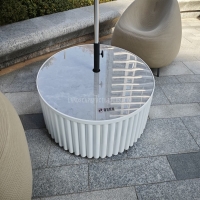Welcome to the website for landscape facilities products and knowledge.
What are the effects of freeze-thaw on concrete aggregates?
Freeze-thaw cycles significantly impact the durability and structural integrity of concrete aggregates. When water penetrates the porous structure of concrete and freezes, it expands by approximately 9%, generating internal pressure. Repeated cycles cause micro-cracks to form and propagate, leading to surface scaling, spalling, and eventual aggregate disintegration.
The severity of damage depends on factors like aggregate porosity, saturation level, and the number of freeze-thaw cycles. Low-quality aggregates with high water absorption are particularly vulnerable. Over time, this degradation reduces compressive strength, increases permeability, and compromises the concrete's load-bearing capacity.
Preventive measures include using air-entraining admixtures to create microscopic air bubbles, which relieve internal pressure. Selecting dense, low-absorption aggregates and proper concrete mix design also enhance resistance. Understanding these effects is crucial for constructing durable infrastructure in cold climates, where freeze-thaw weathering is a major concern for long-term performance.
Modern research focuses on nano-modified concrete and hydrophobic treatments to improve freeze-thaw resistance, offering promising solutions for more resilient construction materials in challenging environments.
Related search:

Recommendation
Round metal tube border design table with tempered glass or granite countertop on the top.